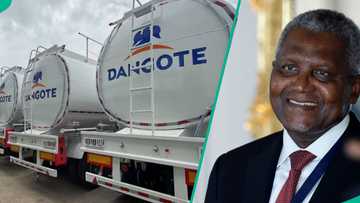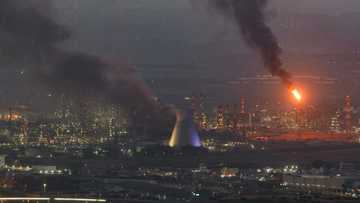Experts Predict New Fuel Prices, Inflation Rate in Nigeria Amid Israeli-Iranian Conflict
- The ongoing Israeli-Iranian conflict could lead to higher prices for fuel and other related goods in Nigeria, significantly impacting the country's inflation
- The Centre for the Promotion of Private Enterprise warned that global inflation and interest rate pressures may worsen, especially for businesses with links to the Middle East
- However, the rise in crude oil prices could benefit Nigeria’s economy by boosting foreign exchange earnings and stabilising the naira exchange rate
Legit.ng journalist Zainab Iwayemi has 5-year-experience covering the Economy, Technology, and Capital Market.
The ongoing Israeli-Iranian confrontation might cause a spike in the price of gas, diesel, jet fuel, petroleum, and other associated goods in Nigeria if it is not promptly resolved, according to a warning from the Centre for the Promotion of Private Enterprise (CPPE).

Source: UGC
According to a statement released by the Centre's CEO, Dr. Muda Yusuf, the breakthrough will also have significant effects on the struggling world economy.

Read also
PETROAN raises alarm over Dangote refinery’s fuel distribution plans, lists negative impact
It contended that the war might affect the cost of production, logistics, transportation, and power generation because energy costs continue to be a significant component of Nigeria's inflation equation.
“This presents an inflationary scenario. These additional costs would be passed on to final consumers, depending on the degree of consumer resistance.
“There is also a global inflation dimension. Energy prices have global inflationary implications. Therefore, there is also an expectation of imported inflation in the unfolding geopolitical scenario,” the Centre argued.
According to CPPE, a tighter monetary policy environment is anticipated in Nigeria and other monetary jurisdictions, as high inflation pushes interest rates and monetary authorities react to the inflationary effects of the present geopolitical headwinds.
It issued a warning that interest rate pressures may reappear in economies around the globe and that rising global interest rates might have a negative effect on portfolio flows and foreign reserves.
“High energy costs, elevated inflationary pressures, and a spike in interest rates are all headwinds that could undermine the profitability of businesses in the economy. Investors in the non-oil sector are likely to be more vulnerable in the present situation.
“Nigerian firms with strong business links in the Middle East and those with strong supply chain linkages in the region would be vulnerable at this time because of the current instability in the region,” the Centre added.

Source: UGC
However, as oil continues to be the country's largest source of foreign exchange revenues, CPPE believes the crisis may also benefit the country's economy, as the spike in the price of crude oil would affect foreign exchange earnings and have a positive ripple effect on the country's economy.
“Crude oil prices have surged to $75 per barrel, which is about 15 percent higher than before the outbreak of the Israeli-Iran conflict. This development would also positively impact the country’s foreign reserves, ensure better forex liquidity, and ultimately the stability of the naira exchange rate,” it argued.
Dangote refinery releases registration details for marketers
Legit.ng reported that Dangote Refinery has announced plans to begin free petrol distribution and diesel to marketers, petrol dealers, manufacturers, telecom companies, aviation, and other large-scale users nationwide.
The mega refinery disclosed in a statement on Sunday, June 15, 2025, that the national free logistics plan, which will begin on August 15, will transform Nigeria’s fuel distribution ecosystem.
According to the statement, the company has procured 4,000 brand-new CNG-powered trucks to ensure the smooth takeoff of the initiative.
Source: Legit.ng




